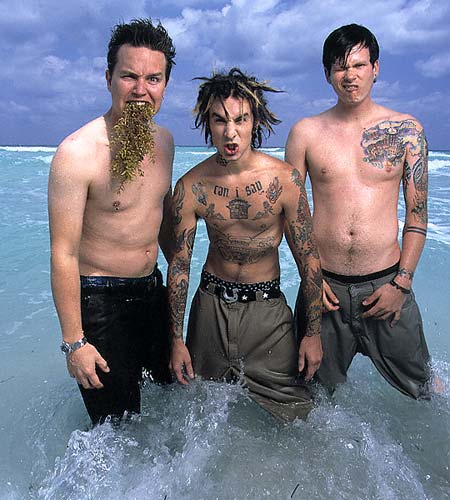
The notion of a guilty pleasure is a strange and degraded one. Obviously, there are things that you can't admit to in polite company, things that don't fit the criteria that society and you yourself set for enjoying things. But in admitting to a guilty pleasure, you are exposing these hidden passions - for this reason, people are squeamish about what they reveal. They might admit liking Eastenders or Desperate Housewives, but never Blink 182. Their bassist has a mouthful of fucking seaweed in the picture above, for crying out loud, and the album I'm writing about is called 'Enema of the State'.
Nevertheless, each of us has enjoyed music that seems repugnant in hindsight. Revisiting 'Enema of the State', the depth and breadth of sexism and puerility on display is truly shocking. Nu-metal, and the more sprightly and appealing pop-punk that developed alongside it at the beginning of this decade was in many ways the nadir of the macho posturing inherent in rock - a mixture of sweaty male bonding and inane self-pity that's truly off-putting to anyone with an ounce of decency.
However, I would argue that Blink 182's approach renders them a partially defensible pleasure. Unlike Limp Bizkit, Blink 182 have enough sense to make themselves the butt of the joke. The frat-house nonsense that infects the album is punctured by songs like 'What's My Age Again?', which demonstrates a degree of self-knowledge and self-doubt that makes the homophobia and sexism a bit more palatable. There's also a clear pop sensibility at play, which made the music an anathema to dull, mohawked punks and the traditional tween audience of pop. Their relative musical and lyrical idiocy also leads to the inclusion of a genuinely pathetic and upsetting song about teen suicide (appalling punks with the use of keyboards).
This was Blink 182's musical highpoint, and it's been downhill from there. The traditional cliché about American culture (oft-spouted by the BBC) is that the American Dream remains upstanding, despite the many disproofs that exist. The pop-punk version of the American Dream as presented by 'Enema of the State' seems closer to the fact - myriad flaws and disgusting attitudes, covered by a surface sheen that is, in my case, irresistible.
